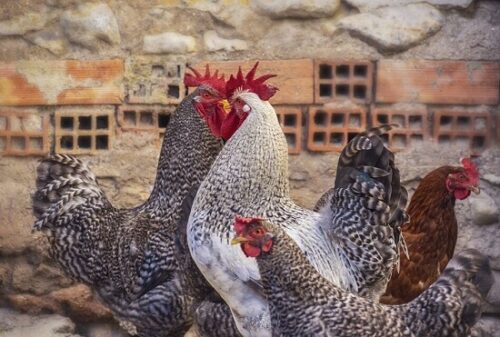It is very important to spend some time each day observing every animal carefully. In this way early signs of disease, malnutrition, or other problems may be discovered, and the necessary precautions taken. How to prevent diseases when farming with chickens
Knowing each hen will also help you choose eggs from the best hen for hatching, so that the chicks may inherit her qualities.
Eggs for sale or hatching should be collected in the morning and again in the evening. In this way they will not be dirty or crack when the hens sit on them and the hens will not be so tempted to brood as when there are many eggs in the nests. Eggs should be stored in a cool and humid place until sale or brooding.
In order to prevent internal as well as external parasites a good hygiene is a must. So every day the feeders and drinkers should be washed, and the house and the nests must be cleaned for droppings, insects etc. Put fresh straw or hay in the nests weekly. Adding a little ash on top may help prevent parasites.

At least a couple of times per year, and always after serious outbreaks of diseases, the house, perches, and nests should be disinfected by thorough cleaning and lime-washing.
Alternative ways of disinfection, e.g. smoking, may be used but are less effective. If problems persist in small wooden cages or houses, they should finally be burned, and a new house built, as parasites may hide in even the smallest cracks
The birds should always have access to a dry place for dust bathing. If they prefer a certain place, you may add a little Sulphur or ash against the parasites. You may encounter problems with hens pecking each other, but mostly in flocks with high density, or if you keep local birds inside during the day. Wounds from pecking should be treated immediately to avoid cannibalism in the flock.
It is advisable to keep records of your production. This will make it easy for you to see successes and problems at an early stage.
Feed and Water
To produce well and have good resistance against diseases, birds need adequate quantities of good quality feed. See Chapter 3 for more advice on feeding and watering. Supplementary feed and clean water should be given at least early in the morning and again in the evening when the birds are returning to the house for the night.
It is important that the feeders and drinkers are kept clean, so that infections do not spread through dirty feed and water.
Young chickens should be fed separately from the adult birds. They will
often have a special diet, and it is best for them not to have to compete with the adults for food. It is very important for small chicks always to have access to clean water, as they may easily die from dehydration. There is more information on management of young chickens later in this chapter.
- YouTube Channel: Farming South Africa
- Facebook Page: Farming Life
- General Farming Farming South Africa
Tags: How to prevent Chicken Diseases, preventing chicken disease, how to help chickens with disease, farming with chickens, How to prevent diseases when farming with chickens

